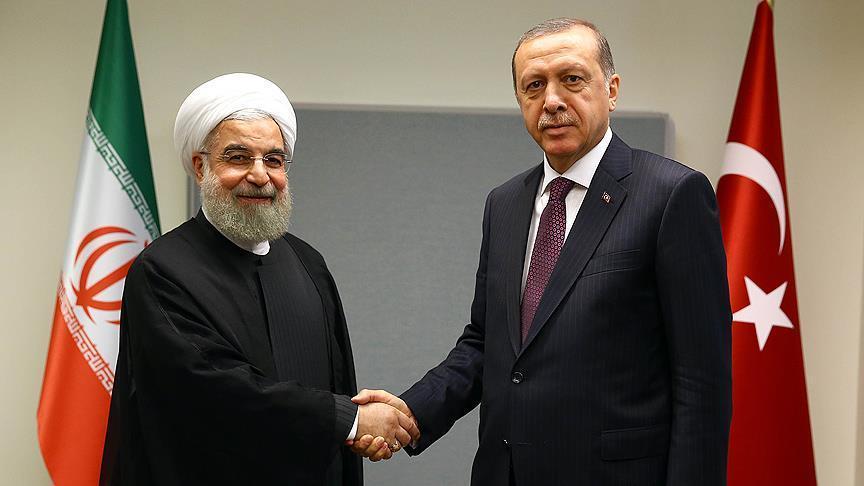
Turkish President Recep Tayyip Erdoğan and his Iranian counterpart Hassan Rouhani spoke on the phone on March 7 about the grave situation in Syria’s Eastern Ghouta, one day after Erdoğan spoke to Russian President Vladimir Putin.
Erdoğan and Rouhani spoke about putting an end to the “humanitarian tragedy” in Ghouta, where regime forces are continuing bombardments despite a U.N Security Council resolution, state-run Anadolu Agency quoted presidential sources as saying.
The two leaders highlighted that Turkey, Iran and Russia’s joint efforts for the implementation of the cease-fire are crucial, the agency reported.
During the conversation, the delivery of humanitarian aid to civilians and ending the disaster in the besieged enclave were recognized as “essential,” Anadolu Agency quoted diplomatic sources as saying.
The conversation came a day after Erdoğan and Putin spoke by phone about Eastern Ghouta and other developments in Syria late on March 6.
The foreign ministers of Turkey, Russia and Iran are due to hold a summit in April to discuss Syria and potential steps in the region, the spokesman for the Turkish Foreign Ministry stated on March 6.
Erdoğan, Putin discuss besieged Eastern Ghouta over phone
Erdoğan and his Russian counterpart Vladimir Putin spoke over the phone about the ongoing human tragedy in Eastern Ghouta and other developments in Syria late on March 6, according to diplomatic sources.
During their conversation, the delivery of humanitarian aid to civilians and ending the disaster in the besieged enclave were deemed as “essential.”
Additionally, in accordance with the U.N. Security Council’s decision, Turkish, Russian and Iranian joint efforts were termed crucial to fully implement a truce in Eastern Ghouta.
At least 10 civilians have been killed in several attacks by Syrian regime forces in Eastern Ghouta in the most recent attack, according to the White Helmets civil defense agency late on March 6.
The Syrian regime’s ground attacks and airstrikes targeted Eastern Ghouta’s Duma and Haresta districts and the Sakba, Ayn Terma, Arbin, Hammuriye, Beit Sava, Jisrin, Hizze and Merc regions.
The attacks killed four civilians in Arbin, three in Jisrin, two in Ayn Terma and one in Beit Sava.
In a statement, U.N. spokesman Stephane Dujarric said Secretary-General Antonio Guterres “is concerned about continued reports of attacks throughout the besieged enclave of Eastern Ghouta which reportedly claimed the lives of more than 100 people on 5 March, as well as reports of shelling of the city of Damascus.”
Dujarric noted that a humanitarian aid convoy operated by the Syrian Arab Red Crescent and the International Committee of the Red Cross was forced to abandon its delivery in Eastern Ghouta’s Douma “because of insecurity.”
“Moreover, a part of the medical and health supplies to be included for delivery was removed by the Syrian authorities,” Dujarric said.
Guterres “calls on all parties to immediately allow safe and unimpeded access for further convoys to deliver critical supplies to hundreds of thousands of people in desperate need, in particular to complete the delivery to Douma, including medical and health supplies, planned for 8 March, in order to reach a total of 70,000 people, as previously agreed with the Syrian authorities,” Dujarric added.
Between Feb. 19 and March 5, a total of 824 civilians were killed in ground and aerial attacks on Eastern Ghouta, according to local civil defense sources.
The regime has continued to conduct ground and air attacks in Eastern Ghouta despite separate cease-fire initiatives endorsed by Russia and the U.N. Security Council.
Home to some 400,000 people, Eastern Ghouta has remained under a brutal siege by the Bashar al-Assad regime, which is being backed by Russia and Iran, for the last five years.
Within the last eight months, regime forces have stepped up their siege, making it nearly impossible for food or medicine to enter the district and leaving thousands of people in need of medical treatment.